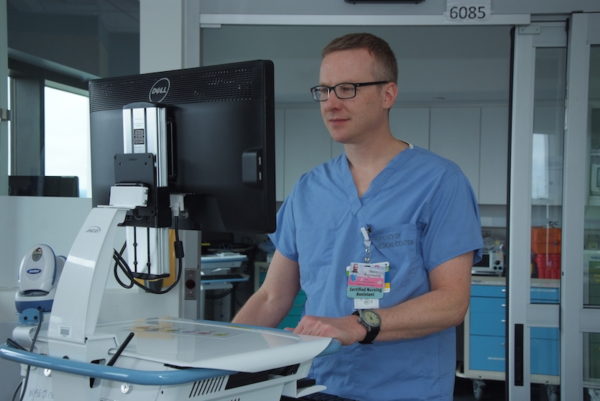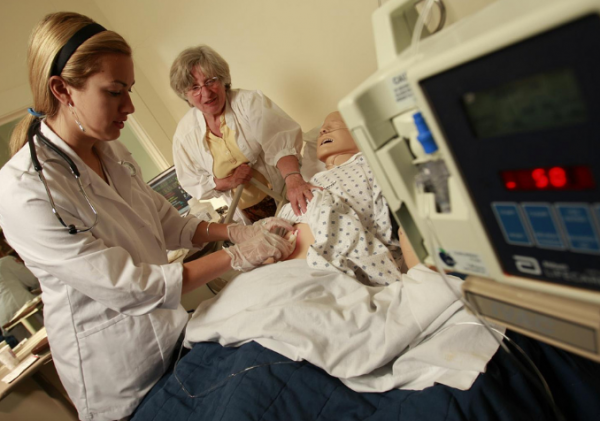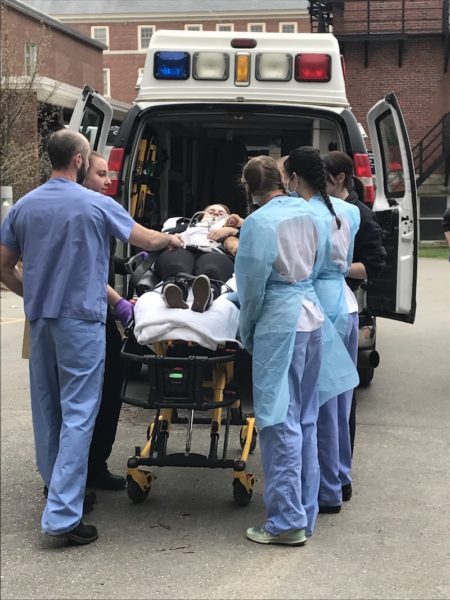For as long as she can remember Michelle Drown has wanted to be a nurse. Getting there has been a challenge. “I am a single mother with two school-aged children,” she told me, “and have been doing my best to maintain my household while working full time and taking a few classes each semester to plug away at my prerequisites for nursing school.”
Michelle works at Maine Medical Center (MMC) as an Ed Tech in the Perioperative Readiness Education Program (PREP). “I am responsible for taking patients’ vital signs, performing blood draws, and obtaining EKGs. I work with a wonderful team of people who are incredibly supportive of my nursing journey. I can’t wait to make them proud!”
Bruce Raymond also wants to be a nurse. He’s currently a Certified Nursing Assistant (CNA) in The Barbara Bush Children’s Hospital’s Pediatric Intensive Care Unit. “I started on my nursing journey a little later in life then many people do,” he said. “I’ll be 44 years old in a couple weeks. My education level is a BS in Biology. I took Maine Medical Center’s CNA Training Course in 2015-2016. My plan since starting as a CNA has been to get a nursing degree. At this point in my life, though, I need to work to earn money to pay my bills and I also need to have health insurance.”
Devyn Poirier, who has been a Surgical Technologist in the operating room at Maine Medical Center for the past five years, is in a similar situation as Michelle. “I’ve been planning to go back to school to become a nurse for some time,” she said, “but working full time and being a mom of two has always made it a little daunting when it came to trying to sign up elsewhere. I wasn’t sure about how the schedule would work or if I could keep my benefits. Moreover, I was concerned about employment opportunities after graduating.”
A partnership
This fall, all three will be going to nursing school full-time, thanks to a new partnership between their employer, Maine Medical Center, and St. Joseph’s College in Standish. Another 21 employees will join them.
They will all be students at St. Joseph’s, only instead of going to the campus for their courses, faculty will teach them at the hospital. They will continue working at MMC but will be able to cut back their hours and keep full-time benefits. The program will extend through the summer so it will only take three years to graduate with a Bachelor of Science in Nursing degree (BSN) instead of the usual four. The students must sign a contract agreeing to stay on at Maine Medical Center for three years after they graduate.
“This program is a unique opportunity,” said Devyn. “I will be able to continue working at an institution that I love, as well as going to school and graduating with a job within the same organization.”
The back story
Here’s how the new program came to be. Soon after Dr. Tony McGuire became Director of the St. Joseph’s College Nursing Program in 2016, the Maine Nursing Action Coalition (MeNAC) issued a report on the critical shortage of nurses in the state. One statement that Tony heard several times struck a chord with him. “That if every nursing school could increase enrollment by 10 or 12 percent, we could put a finger in the dam, so to speak.”
He thought long and hard about how they could do that at St. Joseph’s. He knew it would be difficult to increase enrollment in the college’s regular four-year BSN program. “We couldn’t do it with our current facility or faculty,” said. “There was no way. Otherwise, the quality would suffer and we’d be in trouble.”
Then he heard Marge Wiggins give a presentation at an OMNE Nursing Leaders of Maine meeting. Marge is Senior Vice President of Patient Care Services & Chief Nursing Officer at Maine Medical Center. At the meeting, she offered some ideas on what she thought needed to be done to deal with the nursing shortage. “And one of them was to form partnerships with schools,” she explained. “Partnership to me is much stronger than collaboration. It is investing in the school and the school investing in you. For years and years and years we have been collaborating with schools and on their advisory committees and we’ve been the clinical placements for students, but we haven’t really invested financially.”
Marge spoke Tony’s language and so, he wasted no time introducing himself. “I went up to her right after her talk and I said, I’m the new guy over at St Joe’s and I really want to know you and the hospital and how we can work together for our students. I thought if we could partner with the hospital and come up with some creative, innovative way to do this, we could probably increase the numbers.”
Faculty, time, money, and support
A few weeks later they started hammering out what a partnership might look like. Having enough qualified instructors was critical. St. Josephs had the faculty to teach the academic courses, but not the clinical/hands-on training. Maine Medical Center agreed to take care of providing the clinical faculty.
To make it affordable for students, the college agreed to lower tuition from an average of $25,000 a year (living on campus) to $10,000 a year or a total of $30,000 for three years. It also agreed to a deferred payment option. When they announced the program, they got more than 100 applicants.
“When I first heard of this program I knew I had to apply,” said Michelle. “It means having my bachelor’s degree in nursing in just three years as opposed to having my associates degree in four years at the part-time rate I have been going. It would also mean a brighter future for myself and my children. Being accepted into this program would make my goal of becoming a nurse a reality.”
“The last couple of years I have had to take a couple classes at a time so I can afford the tuition, have the time for classes, work to earn money and keep my health insurance,” said Bruce. “That’s a slow way to get a degree. Although I have a high GPA and have been attracted to some of the accelerated nursing programs offered locally I could not financially afford the programs or afford not to work full time. The new MMC/Saint Joseph’s College program addresses the barriers that have hindered my educational goals.”
The new program has the potential to increase nursing student enrollments at St. Joseph’s as well as help address the nursing shortage at Maine Medical Center. Marge says she’s particularly interested in filling specialty positions, many of which are currently held by nurses about to retire.
New graduates often start out as medical-surgical nurses in the hospital and over the years, develop specialty skills. She wants to take advantage of the new program to teach some of those skills to interested students before they graduate. “In the last semester, I want to offer intensive clinical education in three or four specialties — the emergency department, Intensive Care Unit, operating room, and possibly labor and delivery,” she said. “If they do that, then when they graduate we can take them from there and help them become proficient and competent in a much shorter time.”
If successful, the program could be expanded to include other hospitals in the MaineHealth system, in partnership with other nearby nursing schools. The technology exists to do long distance learning, so St. Joseph’s could also continue to be a partner. “Let’s say I hold the class in the classroom at Maine Med,” explained Tony, “and you’re in Damariscotta and someone else is in Biddeford. You just go to a classroom and your hospital turns on this camera and you’re sitting in the classroom with the rest of the people. We can do the didactic part that way.”
What MMC and St. Joseph’s College are trying to do together can serve as a model for the rest of the state. “I think the success of really addressing the workforce shortage will be the strength of the regional partnerships between the academic partner and the clinical partner,” said MeNAC’s co-chair Lisa Harvey McPherson. “It will really take strengthening those regional structures to increase capacity. And I think they have a good model.”
Other efforts
It may be a good model, but across the state, other nursing programs and hospitals are also trying to find their own workable solutions to the shortage.
Since 2010 the University of Maine System, which runs what is considered the state’s flagship nursing program, has increased enrollment in its nursing programs by 11 percent. As great as that is, it’s still not enough to stem the tide of aging, retiring nurses.
In October 2017, the University of Maine System co-hosted a nursing workforce summit with the Maine Nursing Action Coalition and the Maine Department of Health and Human Services. Their goal was to identify further steps that could be taken to increase enrollment.
Some things are already underway throughout the University of Maine system and at other nursing programs in the state.
- Last year, the University of Maine increased enrollment at its School of Nursing in Orono from 85 to 115. It’s on track to enroll the same number this year.
- In partnership with Husson College and Eastern Maine Community College, this fall UMaine will double clinical placements for nursing students at Eastern Maine Medical Center. “We will provide an instructor for eight students and the hospital will provide one of its staff nurses to serve as a preceptor for an additional eight students at the same time,” explained Dr. Mary Walker, director of the University of Maine Nursing Program. “That way, instead of eight students on a unit, we can accommodate 16.”
- UMaine is establishing a fast-track program at the University of Maine at Machias for people who already have bachelor’s degree and want to go into nursing. The need for more nurses in that area is especially critical because nearly half the registered nurses in Washington and Hancock counties are expected to retire in the next 10 years.
- This fall, the University of Maine at Fort Kent will expand its nursing program to the Presque Isle campus.”
- The University of Maine at Fort Kent piloted an early college initiative this spring that “introduced students from more than a dozen Maine high schools to a nursing career,” said Dan Demeritt, Director of Public Affairs, University of Maine System.” It will be reviewing the results of the online pilot program with University colleagues with the objective of establishing a lasting and effective introduction to nursing program in high schools across Maine.”
- The University of Southern Maine will be partnering with the Lake Region Vocational Center in Naples, Maine to offer an introduction to nursing program to its students.
- St. Joseph’s College received a major grant to expand its nursing program and build a Center for Nursing Innovation.
- St. Joseph’s and the University of Maine will both be offering new adult gerontology acute care nurse practitioner programs.
- The University of New England plans to increase enrollment in its accelerated nursing program by 25 next year. It is also looking at providing more training in rural settings, as well as creating a rural telehealth educational program.
As a followup to the Maine Nursing Workforce Summit last October, seven local advisory groups were formed to work on finding solutions to expanding nursing school enrollments. All of Maine’s 14 nursing schools were invited to participate.
Leaders from each group will meet three times a year to discuss progress and challenges that require a statewide response or resources. Commissioners from the Departments of Health and Human Services, Labor, and Education will be participating. The first meeting of the Commissioners’ Nursing Workforce Advisory Group takes place May 29, 2018.
Optimism
Maine has weathered nursing shortages before. To reiterate what Lisa Harvey-McPherson said in the first segment of Nurses Needed, the key to solving this shortage will be strong regional partnerships between nursing schools and healthcare facilities. Partnerships that benefit all parties, not just the schools and facilities, but also the students, and ultimately the citizens of Maine.
Bruce Raymond certainly considers his chance to become a nurse a huge win. “I love learning,” he said, and am excited to start classes, learn new skills, meet new people, and eventually get my BSN degree and have the opportunity to work as a nurse at MMC. I am so thankful to Maine Medical Center and Saint Joseph’s College for creating this program and look forward to making myself and them proud!”
Upcoming segments of Nurses Needed
The next segment of Nurses Needed runs Friday, May 4. We’ll hear from several men in nursing about why they became nurses, barriers they may have encountered along the way, and how they would encourage other men to consider nursing as a career.
Monday, May 7 will be about advanced practice and community nursing.
Wednesday, May 9 we’ll explore the current status of public health nursing in Maine.
Friday, May 11, we’re going to show our nurses a little love. If you have a story you’d like to share about a Maine nurse, send it to me.
Monday, May 14, we’ll wrap things up with a look back at the history of nursing in Maine.





This is a great idea for MMC to team up with St, Joseph,s College. More hospitals and health care facility could team up together( if needed) and approach colleges for simalar programs. Facilities need to be proactive in these times where nursing is in such demand.
I agree Margaret!
I’m the medical occupations instructor at Westbrook Regional Vocational Center and would love to talk with some regional colleges to look at partnerships for our students.
Great idea! Would a list of them be helpful?